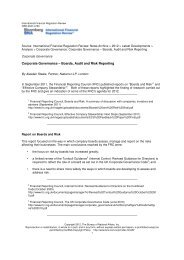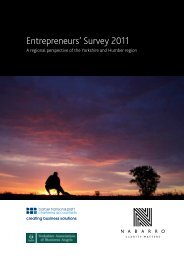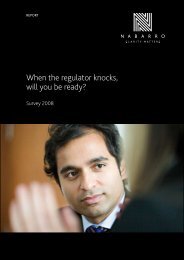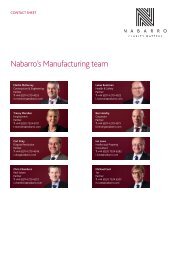The Alternative Investment Fund Managers Directive - Nabarro
The Alternative Investment Fund Managers Directive - Nabarro
The Alternative Investment Fund Managers Directive - Nabarro
Create successful ePaper yourself
Turn your PDF publications into a flip-book with our unique Google optimized e-Paper software.
<strong>The</strong> <strong>Alternative</strong> <strong>Investment</strong><br />
<strong>Fund</strong> <strong>Managers</strong> <strong>Directive</strong><br />
Practical implications for your business
Contents<br />
AIFMD is coming… look busy! 4<br />
Should I care about AIFMD 5<br />
Authorisation 6<br />
Timing 7<br />
Impact on third country managers<br />
and funds 8<br />
Marketing rules 9<br />
Operational requirements 10<br />
Relevant experience 11<br />
More information 13<br />
2
Introduction<br />
<strong>The</strong> scope of the <strong>Alternative</strong> <strong>Investment</strong> <strong>Fund</strong> <strong>Managers</strong> <strong>Directive</strong> (AIFMD) is very broad. It is not<br />
limited by reference to asset classes or investment strategies. It captures all arrangements which look<br />
and feel like investment funds. <strong>Nabarro</strong> has been following the implementation of the AIFMD since<br />
the beginning and advising clients on the impact it will have on their businesses. More information on<br />
our experience can be found later in this document.<br />
<strong>The</strong> AIFMD is seen by many as a burden and an expense: additional regulations, more prescriptive<br />
requirements and procedures, increased reporting and disclosure to both investors and regulators,<br />
and increased capital requirements. But the AIFMD also presents some benefits for your business:<br />
there will be more consistency throughout the industry; potentially you can make cost savings by<br />
streamlining your business model; and in due course there will be a level playing field for marketing<br />
funds and raising capital in the EU.<br />
This document:<br />
• Examines 10 key questions to help you understand the impact of the AIFMD on your business<br />
and fund structures and to consider possible solutions.<br />
• Examines timing issues and the AIFMD's impact on third country managers and funds.<br />
• Sets out in a flowchart how the AIFMD applies to raising capital in the EU under the AIFMD.<br />
3
AIFMD is coming... look busy!<br />
We’ve all been talking about AIFMD for years. But now it’s time to act. Here are 10 key questions to<br />
help you understand if and how you, your funds and your operating practices will be affected.<br />
1. Should I care about AIFMD<br />
Yes, if you work in the EU, in funds, joint ventures or raise<br />
capital.<br />
2. I’m already authorised – do I have to change my<br />
permissions<br />
Yes, probably. This will take about three months, but<br />
could take longer. <strong>The</strong> UK Financial Conduct Authority<br />
(the FSA’s successor body) will accept applications from<br />
23 July 2013, although this may be made earlier.<br />
3. I am not authorised. What do I do<br />
You’ll need to apply to the FCA (or its EU equivalent) for<br />
authorisation under AIFMD if you’re an EU manager. This<br />
should take about three months, but may take longer.<br />
4. What’s the hurry I thought I could wait until July<br />
2014.<br />
If you are managing a fund before 22 July 2013, you have<br />
a year’s grace to get authorised. But this may not be as<br />
great as it sounds - you might not be able to market<br />
existing funds in the EU until you are authorised.<br />
5. What about raising a new fund<br />
If you are launching a fund after 22 July 2013, you will<br />
need to comply with AIFMD in full straight away.<br />
6. And what if I’m outside the EU<br />
If you’re a non-EU manager or marketing a non-EU fund,<br />
marketing will continue to be possible in the EU (initially<br />
without requiring authorisation under AIFMD) using the<br />
private placement regimes, but with conditions attached.<br />
7. Will I need to increase my capital<br />
Probably. Additional funds are also needed to cover<br />
potential professional liability risks.<br />
8. Do I have to appoint a depositary<br />
Yes, unless (for now and depending on which countries you’re<br />
marketing in) it’s for a non-EU fund that you’re not marketing<br />
in the EU, or you’re using the private placement regimes to<br />
market.<br />
9. Will I have to review my compliance procedures<br />
Yes. You will also need to look at what AIFMD means for<br />
your business. You will need to establish separate risk<br />
management, compliance and internal audit functions as<br />
well as various policies and procedures (for instance,<br />
liquidity, valuation and remuneration).<br />
10. What if I do nothing<br />
If you don’t comply, you will probably not be permitted to<br />
raise or market funds.<br />
4
Should I care about AIFMD<br />
<strong>The</strong> short answer is yes. If you work in the EU, in funds, joint ventures or raise capital.<br />
<strong>The</strong> AIFMD will catch real estate funds, private equity funds, hedge funds and most other<br />
arrangements which seek to raise capital from a number of investors. A key exemption<br />
applies to joint ventures (JV), although what constitutes a JV is open to clarification. One<br />
of the key identifying features will be those structures in which each investor has effective<br />
management and control over strategic decisions.<br />
WHO DOES THE AIFMD APPLY TO<br />
<strong>Alternative</strong> <strong>Investment</strong> <strong>Fund</strong> <strong>Managers</strong> (AIFMs), being the managers of collective<br />
investment undertakings (listed or unlisted, open-ended or closed-ended and which invest<br />
in any asset from securities to real estate and fine wines to precious metals) managed or<br />
marketed in the EU. Undertakings for Collective <strong>Investment</strong> in Transferable Securities<br />
(UCITS) are not included and are separately regulated under the UCITS <strong>Directive</strong>.<br />
Depositaries and certain other service providers will also be subject to the AIFMD to<br />
varying degrees.<br />
Scope of the AIFMD<br />
WHAT IS AN ALTERNATIVE INVESTMENT FUND (AIF)<br />
<strong>The</strong> following diagram sets out some of the determining factors when considering if an<br />
undertaking is an AIF. <strong>The</strong>y are neither cumulative nor determinative on their own, but<br />
demonstrate the breadth of the AIFMD.<br />
Not an ordinary company<br />
External manager<br />
More than one investor<br />
AIF<br />
Defined investment policy<br />
External capital<br />
Capital pooled<br />
EU<br />
AIFMD will have an impact<br />
Where is the<br />
AIFM<br />
established<br />
EU<br />
EU<br />
AIFMD has no<br />
impact<br />
Non-EU<br />
Where is the<br />
fund<br />
established<br />
Non-EU<br />
Where is the<br />
AIF marketed<br />
Non-EU<br />
5
Authorisation<br />
I’M ALREADY AUTHORISED –<br />
DO I HAVE TO CHANGE MY PERMISSIONS<br />
Yes, almost certainly.<br />
In the UK, there will be new regulated activities, including<br />
“managing an AIF” and “managing a UCITS”. You will have<br />
to apply for these permissions through a variation of<br />
permission application. Some of the current regulated<br />
activities will become redundant and there will also be<br />
limits on the types of regulated activities AIFMs can<br />
perform (this will be particularly relevant for MiFID<br />
investment firms).<br />
<strong>The</strong> Financial Conduct Authority, the successor body to the<br />
FSA from 1 April 2013 (FCA), has up to three months to<br />
consider applications for authorisation under the AIFMD,<br />
but it can extend this to up to six months.<br />
Having originally proposed being open for new applications<br />
or a variation of permissions from 23 July 2013, the FCA is<br />
currently considering various options to minimise disruption<br />
to your business, including accepting applications before 23<br />
July 2013. <strong>The</strong> FCA has run an online survey to help it gauge<br />
the number, nature and timing of applications under the<br />
AIFMD. <strong>The</strong> survey closed on 28 March.<br />
I AM NOT AUTHORISED. WHAT DO I DO<br />
You’ll need to apply to the FCA (or its EU equivalent) for<br />
authorisation under the AIFMD if you’re an EU manager.<br />
This should take about three months, but the FCA can<br />
extend the overall time period to six months.<br />
Watch out for who is doing what and which parts of the<br />
AIFMD apply. For instance:<br />
• where no external AIFM is appointed (i.e. the board of<br />
directors maintains responsibility for portfolio and risk<br />
management), the AIF will be its own AIFM (an internallymanaged<br />
AIF) and will require authorisation/registration;<br />
and<br />
• if an AIFM delegates investment management functions<br />
to an extent that exceeds “by a substantial margin” those<br />
it retains, it will be considered a “letter box entity” and<br />
therefore, not considered as the AIFM. <strong>The</strong>re are also<br />
other criteria to consider if functions are being delegated<br />
by the AIFM.<br />
<strong>The</strong>re may be a “marketing gap” between the implementation date<br />
(22 July 2013) and the date you obtain authorisation during which<br />
you will face stumbling blocks marketing and managing AIFs in<br />
other EU member states.<br />
6
Timing<br />
WHAT’S THE HURRY I THOUGHT I COULD WAIT<br />
UNTIL JULY 2014.<br />
<strong>The</strong> “marketing gap”<br />
If you are managing a fund before 22 July 2013, you have a<br />
year’s grace to get authorised. But this may not be as great<br />
as it sounds – you might not be able to market existing<br />
funds in the EU until you are authorised. This “marketing<br />
gap” will arise if member states do not extend the one<br />
year’s grace period to AIFMs from other member states; in<br />
other words if they do not allow an EU AIFM to market in<br />
their jurisdiction without being authorised under the<br />
AIFMD. It will not therefore be an issue for all AIFMs raising<br />
capital in the UK alone.<br />
AIFMs operating under this regime will not be able to take<br />
advantage of the marketing passport.<br />
By 22 July 2014 all EU AIFMs are required to be authorised<br />
under the AIFMD by their home member state regulator.<br />
However, as described above, existing AIFMs may require<br />
earlier authorisation (i.e. from 22 July 2013) to market<br />
existing AIFs in the EU.<br />
Non-EU AIFMs should be able to obtain authorisation from<br />
their member state of reference (broadly, the member<br />
state where the AIFM intends to perform the majority of its<br />
activities) from autumn 2015.<br />
WHAT ABOUT RAISING A NEW FUND<br />
If you are launching a fund after 22 July 2013, you will need<br />
to comply with the AIFMD in full straight away. You should<br />
be considering this when preparing your fund documents<br />
and marketing strategy.<br />
Transitional provisions<br />
<strong>The</strong> AIFMD will not apply to managers of closed-ended<br />
AIFs which have either stopped investing before 22 July<br />
2013 or which will have both held their final closing before<br />
22 July 2013 and terminated prior to 22 July 2016.<br />
Small AIFM regime<br />
For small AIFMs, the AIFMD permits member states to<br />
operate a registration and disclosure regime. This applies to<br />
managers whose assets under management (AUM) do not<br />
exceed €100m, or, for certain closed-ended, unleveraged<br />
AIFs, €500m. This threshold is calculated on an aggregated<br />
portfolio basis, by identifying all AIFs that the AIFM<br />
manages: it excludes UCITS managed by the AIFM and<br />
portfolios where management has been delegated to the<br />
AIFM, but includes AIFs where the AIFM has delegated<br />
management to a third party.<br />
FSA CP2<br />
on transposing<br />
the AIFMD<br />
from the FCA<br />
ESMA RTS on<br />
types of AIFM,<br />
key concepts &<br />
AIFM reporting<br />
FCA<br />
Policy Statement<br />
FCA to begin accepting applications<br />
EU AIFMs need to<br />
be authorised<br />
unless TP applies<br />
TP ends<br />
All AIFMs must be<br />
AIFMD compliant<br />
19 March Q2 June 22 July 2013 21 July 2014<br />
7
Impact on third country managers and funds<br />
WHAT IF I’M OUTSIDE THE EU<br />
If you’re a non-EU AIFM of a non-EU AIF and do not market<br />
in the EU, the AIFMD will not affect you. In all other<br />
scenarios it will.<br />
If you are a non-EU manager managing and/or marketing<br />
an EU or non-EU AIF, much of the AIFMD will not apply to<br />
you initially. This will change from 2015 and/or 2018 when<br />
the marketing regimes could change.<br />
Non-EU managers can still market their funds (EU or<br />
non-EU) in the EU (initially without requiring authorisation<br />
under the AIFMD) using the private placement regimes,<br />
but with conditions attached. <strong>The</strong>se conditions are as<br />
follows:<br />
1. a co-operation agreement is in place between the<br />
authorities of each member state where the AIF is to be<br />
marketed, (where relevant) of the EU AIF and of the<br />
third country where the AIFM is established; and (for<br />
non-EU AIFs) between the authorities of the AIFM’s<br />
home member state and of the third country where the<br />
non-EU AIF is established;<br />
2. the AIF’s jurisdiction must not be on an anti-money<br />
laundering or terrorist financing list; and<br />
3. compliance with certain other requirements in the<br />
AIFMD (annual reports, disclosure to investors, reporting<br />
to regulators and the provisions relating to acquiring<br />
control of unlisted companies and asset stripping).<br />
Member states are free to impose stricter rules under the<br />
private placement regimes. We are aware of certain EU<br />
member states, most notably Germany, who are planning<br />
to make their private placement regimes much more<br />
stringent.<br />
When the private placement regimes are phased out,<br />
affected AIFMs will have to comply with the AIFMD in full.<br />
A further condition will also apply at this point – ensuring<br />
that tax information exchange agreements are in place.<br />
Non-EU AIFMs will be permitted to manage and/or market<br />
any AIFs in the UK from 22 July 2013, provided they:<br />
• notify themselves to the FCA; and<br />
• comply with certain of the provisions in the AIFMD.<br />
<strong>The</strong>y will not, however, be able to make use of the passport<br />
to manage or market in other EU member states.<br />
8
Marketing rules<br />
<strong>The</strong> following flowcharts provide a summary of the AIFMD requirements to market AIFs in the EU – for EU<br />
AIF and non-EU AIF managed by an EU AIFM or a non-EU AIFM.<br />
FULL COMPLIANCE WITH AIFMD<br />
DUAL SYSTEM<br />
Is the AIF<br />
marketed<br />
in the EU<br />
YES<br />
July 2013 1<br />
2013<br />
July 2014 2 PASSPORT<br />
FULL COMPLIANCE WITH AIFMD<br />
Is the AIF<br />
marketed<br />
in the EU<br />
YES<br />
2013−2018 Private Placement Regimes<br />
Full AIFMD compliance except on depositary 7<br />
Some third country requirements apply<br />
Member states may impose stricter rules<br />
2015<br />
PASSPORT<br />
Full AIFMD compliance<br />
+ all third country<br />
requirements + MSR<br />
EU<br />
AIF<br />
Where<br />
is the<br />
AIFM<br />
EU<br />
NO<br />
July 2013<br />
July 2014<br />
DUAL SYSTEM<br />
PASSPORT<br />
NOT<br />
APPLICABLE<br />
Non-EU<br />
AIF<br />
Where<br />
is the<br />
AIFM<br />
EU<br />
NO<br />
COMPLIANCE WITH AIFMD<br />
To comply with all of AIFMD except for depositary<br />
and annual report requirements<br />
Co-operation agreement in place<br />
PASSPORT<br />
NOT<br />
APPLICABLE<br />
NON-EU<br />
Is the AIF<br />
marketed<br />
in the EU<br />
YES<br />
2013−2018/19 Private Placement Regimes<br />
AIFMD compliance on annual report, disclosure to<br />
investors and reporting to regulators 3<br />
Some third country requirements apply 4<br />
Member states may impose stricter rules<br />
FULL COMPLIANCE WITH AIFMD<br />
2015<br />
PASSPORT<br />
Full AIFMD compliance<br />
+ all third country<br />
requirements 5 + MSR 6<br />
NON-EU<br />
Is the AIF<br />
marketed<br />
in the EU<br />
YES<br />
DUAL SYSTEM<br />
2013−2018/19 Private Placement Regimes<br />
AIFMD compliance on annual report, disclosure<br />
and reporting only<br />
Some third country requirements apply<br />
Member states may impose stricter rules<br />
2015<br />
PASSPORT<br />
Full AIFMD compliance<br />
+ all third country<br />
requirements + MSR<br />
NO<br />
[July] 2015 All third country requirements + MSR<br />
PASSPORT NOT<br />
APPLICABLE<br />
NO<br />
OUTSIDE SCOPE<br />
1 July 2013: If you are launching a fund after 22 July 2013, you will need to comply with AIFMD in full straight away.<br />
2 July 2014: If you are managing a fund before 22 July 2013, you have until 22 July 2014 to get authorised. Although you may need to get authorised straight away to market existing funds in the EU.<br />
3 Requirements on controlling interests may also apply.<br />
4 Including having cooperation arrangements in place between EU and non-EU authorities and AIFMD compliance with anti-money laundering and terrorist financing requirements.<br />
5 In addition to those conditions applicable under the private placement regimes, a tax information exchange agreement must be in place between the EU and the non-EU authorities.<br />
6 <strong>The</strong> AIFM must designate a member state of reference (MSR) and appoint a legal representative (to perform compliance functions for management and marketing activities).<br />
7 Although no depositary is required, there must be an entity that complies with AIFMD in respect of monitoring cash flows, custodian and general oversight tasks.<br />
9
Operational requirements<br />
WILL I NEED TO INCREASE MY CAPITAL<br />
An AIFM must maintain a minimum level of own funds<br />
(capped at €10m) of €125,000 plus 0.02 per cent of the<br />
amount by which the total value of its gross assets under<br />
management (being all funds managed by the AIFM other<br />
than funds which it manages as a sub-manager) exceeds<br />
€250m. For internally-managed AIFMs the minimum level<br />
of own funds is €300,000.<br />
In addition, AIFMs will have to cover their professional<br />
liability risks through the use of additional own funds or<br />
professional indemnity insurance. An AIFM cannot choose<br />
to use a combination of the two.<br />
Where applicable, the amount of additional own funds for<br />
covering liability risks shall be equal to at least 0.01 per<br />
cent of the value of the AIFM’s AUM. Any professional<br />
indemnity insurance must be sufficient to cover<br />
aggregated annual claims equal to at least 0.9 per cent of<br />
the AIFM’s AUM. If an AIFM is subject to the Capital<br />
Requirements <strong>Directive</strong>, it may be required to hold more<br />
capital than it does under the AIFMD.<br />
DO I HAVE TO APPOINT A DEPOSITARY<br />
Yes, unless (for now and depending which countries you’re<br />
marketing in) it’s for a non-EU fund that you’re not<br />
marketing in the EU, or you’re using the private placement<br />
regimes to market. A depositary will not be required:<br />
• for an EU AIFM in respect of a non-EU AIF – which is<br />
either not being marketed at all, or is being marketed in<br />
the EU member states under the private placement<br />
regimes;<br />
• for a non-EU AIFM in respect of an EU AIF being marketed<br />
under the private placement regimes; and<br />
• for a non-EU AIFM in respect of a non-EU AIF being<br />
marketed under the private placement regimes.<br />
<strong>The</strong> custody duties of depositaries apply to a very broad<br />
range of financial instruments. Depositaries also have<br />
extensive obligations to supervise the AIFM which go<br />
beyond traditional custody functions. <strong>The</strong> depositary can<br />
also be liable for the loss of any custody assets (subject to<br />
a very limited defence). This applies to assets it loses, as<br />
well as those which any delegate might lose.<br />
WILL I HAVE TO REVIEW MY COMPLIANCE<br />
PROCEDURES<br />
Yes. <strong>The</strong> AIFMD will introduce change in various areas,<br />
including: minimum capital requirements, depositaries,<br />
delegation, professional indemnity insurance,<br />
remuneration, valuation, leverage, marketing and third<br />
country requirements. You will need to establish separate<br />
risk management, compliance and internal audit functions<br />
as well as various policies and procedures (for instance,<br />
liquidity, valuation and remuneration). You will also need<br />
to look at what the AIFMD means for your business in<br />
general. For instance, the definition of “non-financial<br />
counterparties” in EMIR on OTC Derivatives includes all<br />
real estate funds which fall within the broad scope of the<br />
AIFMD, regardless of size.<br />
WHAT IF I DO NOTHING<br />
If you don’t comply, you will probably not be permitted to<br />
raise or market funds.<br />
Valuation<br />
An AIFM has to ensure a proper and independent<br />
valuation of the AIF’s assets. <strong>The</strong> AIFM is responsible,<br />
whether it does the valuation itself or appoints an<br />
external valuer. <strong>The</strong> AIFM can only do the valuation itself<br />
if this task is functionally independent from portfolio<br />
management (and similar provisions apply if the<br />
depositary is appointed as the external valuer).<br />
Fair treatment of investors<br />
<strong>The</strong> AIFM must ensure that investors are treated fairly.<br />
This includes not charging undue costs and ensuring that<br />
any preferential treatment given by the AIFM to one or<br />
more investors does not result in a material<br />
disadvantage to the other investors.<br />
Preferential treatment disclosed to investors<br />
Preferential treatment of an investor is only permitted<br />
where the other investors are informed of that<br />
preferential treatment. This may impact on an AIFM’s<br />
and AIF’s approach to side letters and most favoured<br />
nation provisions.<br />
Details of how the AIFM ensures the fair treatment of<br />
investors and of any preferential treatment will have to<br />
be covered in any information memorandum or offering<br />
document.<br />
10
Our relevant experience<br />
We have advised numerous clients on how the AIFMD will affect their businesses. This includes<br />
UK-based managers and non-EU fund managers on issues relating to scope, authorisation,<br />
restructuring, marketing and more.<br />
NABARRO LEADING THE DEVELOPMENT OF AIFMD<br />
Our lawyers have been active participants in the<br />
development of the AIFMD which means that we fully<br />
understand the issues and challenges faced by clients<br />
relating to the directive.<br />
• Adrian Brown has assisted the British Property Federation,<br />
the Property Industry Alliance, the Association of Real<br />
Estate <strong>Fund</strong>s and the European Public Real Estate<br />
Association in lobbying the FSA, the European<br />
Commission and various other organs of the European<br />
Union about the AIFMD.<br />
• Adrian is also a member of the <strong>Investment</strong> Property<br />
Forum’s Regulation and Legislation group and led the<br />
IPF’s response to the FSA’s consultation paper on the<br />
AIFMD.<br />
• Darren Stolzenberg is a member of the INREV Public<br />
Affairs Committee focusing on the impact of the AIFMD.<br />
• <strong>Nabarro</strong> also has partners who are members of the<br />
INREV management committee and members of the<br />
FSA’s Legal Experts Group which aims to facilitate a<br />
smooth transition of the AIFMD into UK law.<br />
REGULATORY<br />
<strong>The</strong> ever-increasing level of regulation in the financial<br />
services sector, and the need to protect hard-won<br />
reputations, means that clear, high quality and relevant<br />
advice is a must for regulated firms. We advise a broad range<br />
of clients on all aspects of financial services regulation. We<br />
have a wide range of recent relevant experience including:<br />
• Advising various fund managers on the effect of the<br />
AIFMD (see previous case study).<br />
• Mountgrange – advising on the impact of the AIFMD on<br />
existing fund structures, including in the context of a<br />
company reorganisation.<br />
• Santander Asset Management – advising on the impact<br />
of the AIFMD on its existing regulated funds (Non-UCITS<br />
Retail Schemes), developing an implementation and action<br />
plan, liaising with legal, compliance, risk and other teams.<br />
• Confidential – advising a US private equity fund and its<br />
manager on the impact of the AIFMD on marketing the<br />
fund in the EU, asset stripping provisions and<br />
coordinating advice on the private placement regimes in<br />
20 global jurisdictions using our network on international<br />
law firms.<br />
• Confidential – advising on the establishment of a unique<br />
regulated fund, including drafting all the necessary<br />
constitutional documents and prospectus to comply with<br />
the FSA’s rules on disclosure to investors (similar to new<br />
requirements under the AIFMD).<br />
• Aimar Capital – assisting with application for<br />
authorisation for this soon to be established sister<br />
company of a US private equity fund management<br />
company.<br />
• AXA – advising on the regulatory issues in structuring a<br />
new fund.<br />
• German bank – advice on the establishment of a UK<br />
branch and passporting under the Markets in Financial<br />
Instruments <strong>Directive</strong>; drafting UK terms of business and<br />
internal policies and procedures.<br />
11
Our relevant experience<br />
FUNDS AND INDIRECT REAL ESTATE<br />
Our <strong>Investment</strong> <strong>Fund</strong>s team is top-ranked by Chambers for<br />
real estate funds and was voted the Best European Law<br />
Firm for transactions at the 2011 Global Private Equity Real<br />
Estate Awards. Recent major fund highlights include:<br />
• Cordea Savills – establishment of Prime London<br />
Residential Development LP.<br />
• Tristan Capital Partners – establishment of European<br />
Property Investors Special Opportunities 3 LP.<br />
• Tristan Capital Partners – establishment of Curzon<br />
Capital Partners III LP.<br />
• Rockspring – establishment of Rockspring TransEuropean<br />
Property V.<br />
• AXA – establishment of AXA’s UK Long Lease Property<br />
Unit Trust.<br />
• Aviva Investors – acting on the establishment of the<br />
REaLM series of funds established offshore and looking to<br />
invest in different UK sectors.<br />
• Duet/Forum – acting for the co-sponsor on the<br />
establishment of the Duet Credit Opportunities <strong>Fund</strong>.<br />
• Duet/Forum – acting for the co-sponsor on the Duet<br />
European Debt <strong>Fund</strong>.<br />
• APG – acting for the cornerstone investor on the<br />
establishment of Pramerica Real Estate Investors I.<br />
•<br />
OUR CLIENTS<br />
We act for a broad range of clients. Our fund manager<br />
clients include AXA, Aviva Investors, CBRE Global Investors,<br />
Cordea Savills, Frogmore, Grosvenor, Hermes, Mansford,<br />
Melford, Mountgrange, Rockspring, Standard Life, Tristan<br />
Capital Partners, UBS and UNITE. Our institutional investor<br />
clients include Middle Eastern Sovereign Wealth <strong>Fund</strong>s,<br />
Canadian and Malaysian Pension <strong>Fund</strong>s, UK multi<br />
managers including CBRE GMM, Henderson and LaSalle<br />
and Alecta, APG, ATP and Hermes.<br />
CASE STUDY<br />
Impact of the AIFMD on a global fund<br />
manager<br />
A leading fund manager client engaged us to<br />
advise on the impact of the AIFMD on its<br />
corporate structures. <strong>The</strong> structures included a<br />
number of joint ventures, fund vehicles, holding<br />
companies and master/feeder funds. <strong>The</strong> client<br />
was particularly concerned over the lack of<br />
available law and guidance on the treatment of<br />
joint ventures.<br />
We met with the client to discuss its primary<br />
concerns and carried out an analysis of the<br />
various structures. We advised the client on the<br />
appropriate categorisation of each structure and<br />
set out how the AIFMD would impact each<br />
structure: identifying the AIFs and AIFMs within<br />
the structure and advising on any potential<br />
problems regarding delegation to other advisers.<br />
We continue to work with this client on<br />
implementing the AIFMD in the most effective<br />
and cost efficient way; advising on possible<br />
options for restructuring the arrangements and<br />
making changes to the client’s structures.<br />
12
More information<br />
If you’re caught by the AIFMD, and need any help assessing its impact on your structures, shaping your<br />
implementation plans, applying for authorisation or developing appropriate policies, procedures and<br />
actions, please call us.<br />
Adrian Brown<br />
Partner<br />
T +44 (0)20 7524 6400<br />
aj.brown@nabarro.com<br />
Darren Stolzenberg<br />
Partner<br />
T +44 (0)20 7524 6191<br />
d.stolzenberg@nabarro.com<br />
Andrew Wylie<br />
Partner<br />
T +44 (0)20 7524 6011<br />
a.wylie@nabarro.com<br />
Chris Luck<br />
Partner<br />
T +44 (0)20 7524 6294<br />
c.luck@nabarro.com<br />
13
For further information visit:<br />
www.nabarro.com<br />
London<br />
Lacon House 84 <strong>The</strong>obald’s Road<br />
London WC1X 8RW<br />
T +44 (0)20 7524 6000<br />
Sheffield<br />
1 South Quay Victoria Quays<br />
Sheffield S2 5SY<br />
T +44 (0)114 279 4000<br />
Brussels<br />
209A Avenue Louise 1050 Brussels<br />
Belgium<br />
T +32 2 626 0740<br />
Singapore<br />
50 Raffles Place<br />
22-01 Singapore Land Tower<br />
Singapore 048623<br />
T +65 6645 3280<br />
Alliance firms:<br />
France August & Debouzy<br />
Gilles August<br />
T +33 (0)1 45 61 51 80<br />
www.august-debouzy.com<br />
Germany GSK Stockmann + Kollegen<br />
Rainer Stockmann<br />
T +49 (30) 20 39 07 - 0<br />
www.gsk.de<br />
Italy Nunziante Magrone<br />
Gianmatteo Nunziante<br />
T +39 06 695181<br />
www.nunziantemagrone.it<br />
Spain Roca Junyent<br />
Miquel Roca Junyent<br />
T +34 93 241 92 00<br />
www.rocajunyent.com<br />
14<br />
<strong>Nabarro</strong> LLP<br />
Registered office: Lacon House, 84 <strong>The</strong>obald’s Road, London, WC1X 8RW.<br />
<strong>Nabarro</strong> LLP is a limited liability partnership registered in England and Wales (registered number OC334031). It is a law firm authorised and regulated by the<br />
Solicitors Regulation Authority. A list of members of <strong>Nabarro</strong> LLP and of the non-members who are designated as partners is open to inspection at the registered<br />
office. <strong>The</strong> term partner is used to refer to a member of <strong>Nabarro</strong> LLP or to an employee or consultant with equivalent standing and qualifications in one of <strong>Nabarro</strong><br />
LLP’s affiliated undertakings.<br />
Detailed specialist advice should be obtained before taking or refraining from any action as a result of the comments made in this publication, which are only<br />
intended as a brief introduction to the particular subject. This information is correct on the date of publication.<br />
© <strong>Nabarro</strong> LLP 2013<br />
11218











